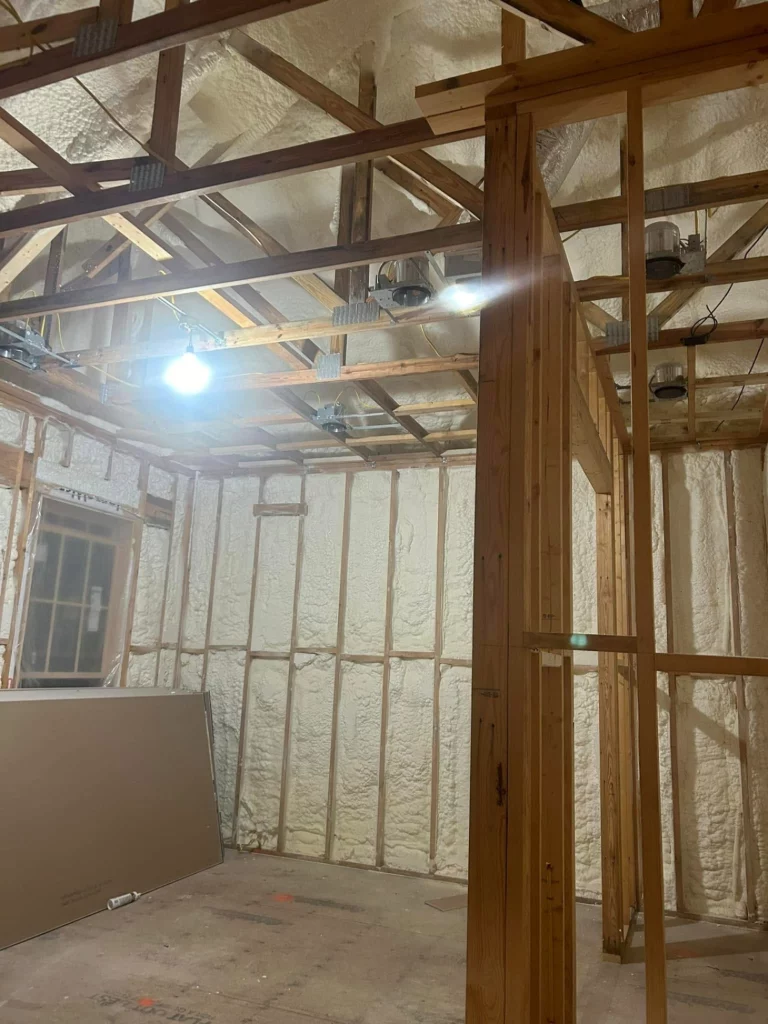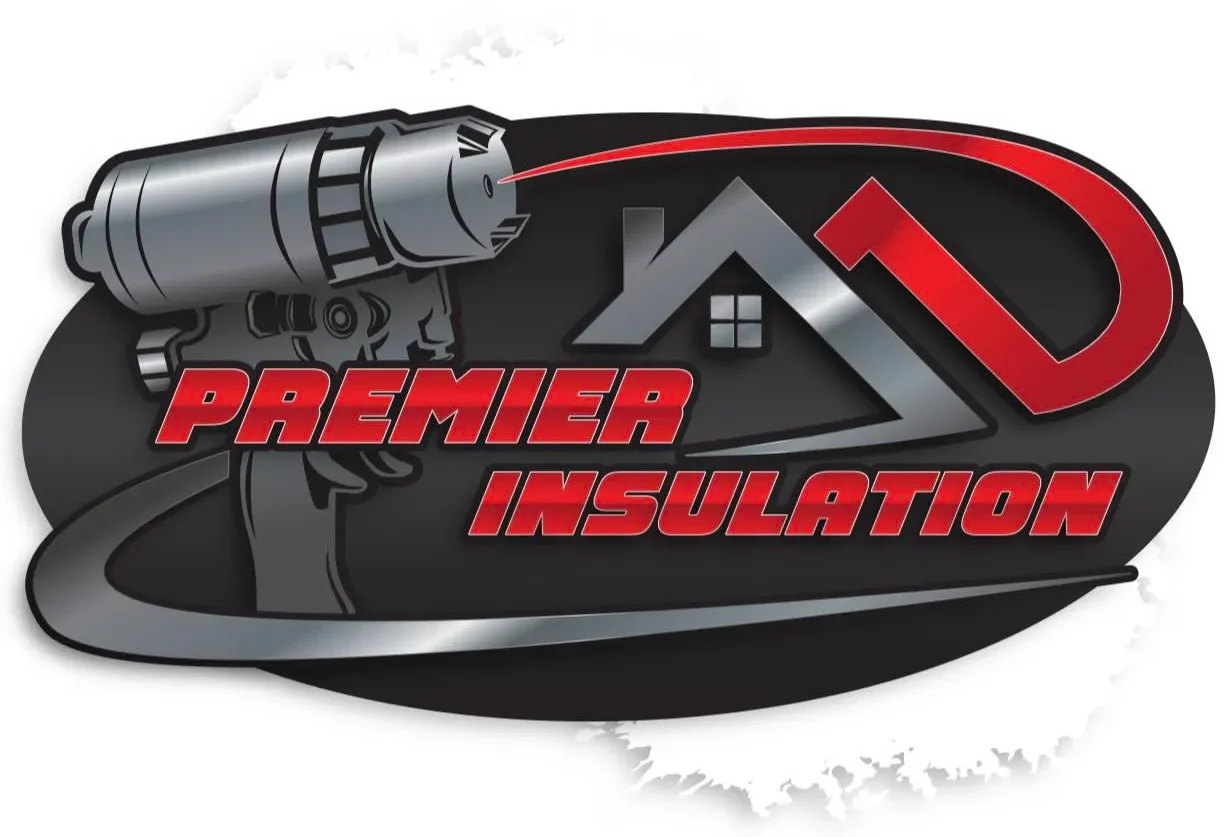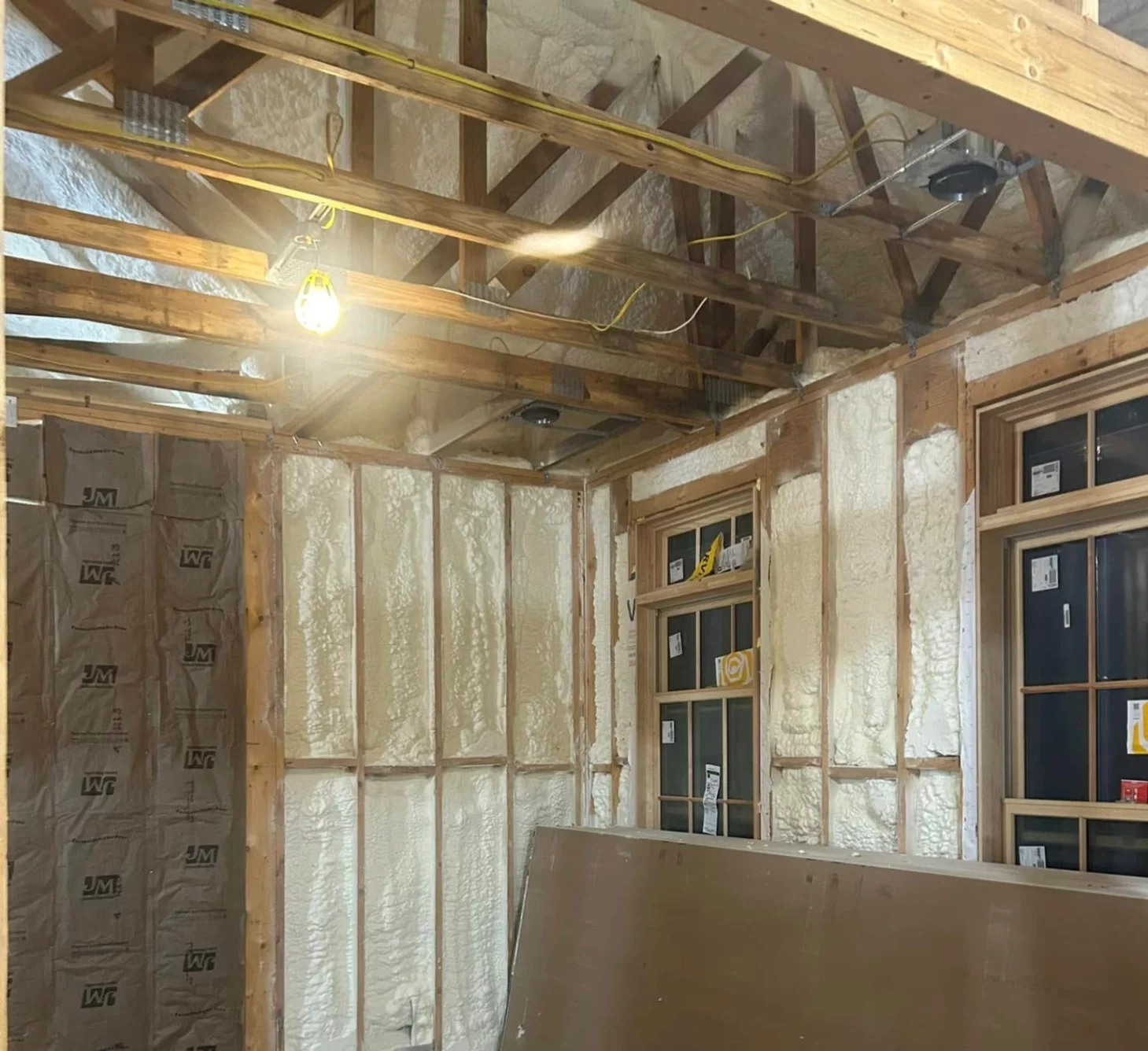Spray foam insulation reduces energy bills in Dothan by creating an airtight thermal barrier that eliminates air leakage and maintains consistent indoor temperatures. Homeowners typically see 20-40% reduction in heating and cooling costs within the first year of installation, with closed-cell spray foam delivering the highest energy savings due to its superior R-value and moisture resistance properties.
Dothan’s humid subtropical climate creates unique energy challenges that spray foam insulation addresses more effectively than traditional insulation materials. The combination of hot, humid summers requiring constant air conditioning and mild winters still demanding heating makes thermal efficiency crucial for controlling utility expenses year-round.
Premier Insulation GA has observed consistent energy performance improvements across residential and commercial properties throughout the Dothan area, with proper installation techniques being critical for maximizing these benefits.
Our work was recently featured in a press release highlighting Premier Insulation GA’s contribution to improving energy efficiency across Dothan homes and businesses.
Understanding Spray Foam’s Energy-Saving Mechanism
Spray foam insulation works by expanding upon application to fill gaps, cracks, and cavities that allow conditioned air to escape. Unlike traditional insulation that simply slows heat transfer, spray foam creates a complete air seal while providing thermal resistance.
The material’s cellular structure traps air within thousands of tiny bubbles, creating an effective barrier against heat transfer through conduction, convection, and radiation. This comprehensive approach addresses the primary causes of energy loss in Dothan homes.
Performance Comparison by Insulation Type
| Insulation Type | R-Value per Inch | Air Sealing | Moisture Resistance | Energy Savings Potential |
|---|---|---|---|---|
| Closed-Cell Spray Foam | 6.0-7.0 | Excellent | Excellent | 30-40% |
| Open-Cell Spray Foam | 3.5-4.0 | Very Good | Good | 20-30% |
| Fiberglass Batts | 3.2-3.8 | Poor | Poor | 10-15% |
| Blown-In Cellulose | 3.2-3.8 | Fair | Fair | 15-20% |
Bonus Tip: Closed-cell spray foam performs exceptionally well in Dothan’s climate because it prevents moisture infiltration that can reduce the effectiveness of other insulation types during humid summer months.
Climate-Specific Benefits for Dothan Properties
Dothan’s average annual temperature of 65°F with summer highs reaching 92°F and winter lows around 38°F creates significant temperature differentials that challenge building envelopes. According to the U.S. Energy Information Administration, Alabama residents spend approximately 60% of their energy bills on heating and cooling.
The region’s 55-inch annual rainfall and humidity levels averaging 70% make moisture control essential for maintaining insulation performance. Spray foam’s moisture resistance prevents the degradation common with traditional insulation materials in humid climates.
Energy Consumption Data for Dothan Area
| Season | Average Monthly kWh Usage | Primary Energy Use | Spray Foam Impact |
|---|---|---|---|
| Summer (Jun-Aug) | 1,450-1,650 | Air Conditioning (65%) | 35-45% reduction |
| Fall/Spring (Sep-Nov, Mar-May) | 950-1,150 | Mixed HVAC (45%) | 25-35% reduction |
| Winter (Dec-Feb) | 1,200-1,400 | Heating (55%) | 30-40% reduction |
Installation Areas That Maximize Energy Savings
Strategic placement of spray foam insulation targets the most significant sources of energy loss in Dothan homes. Attic spaces, crawl spaces, and exterior walls represent the primary opportunities for improvement.
Attic insulation provides the greatest return on investment, as heat rises and escapes through the roof during winter while radiant heat penetrates down during summer. Spray foam application to the underside of roof decking creates a conditioned attic space that reduces HVAC system strain.
Crawl space encapsulation with spray foam addresses moisture issues while preventing ground moisture from affecting indoor humidity levels. This approach reduces the workload on dehumidification systems common in Dothan homes.
Bonus Tip: Sealing rim joists and band boards with spray foam typically costs less than $500 but can reduce energy bills by 5-10% annually by eliminating major air leakage points.Wall cavity insulation becomes particularly effective when combined with air sealing around electrical outlets, plumbing penetrations, and window frames. The expanding nature of spray foam ensures complete coverage around these irregular spaces that traditional insulation cannot adequately fill.

Long-Term Financial Impact Analysis
Energy savings from spray foam insulation compound over time, with most installations paying for themselves within 3-5 years through reduced utility bills. The National Association of Home Builders reports that proper insulation improvements can increase home value by up to 6%.
Spray foam’s durability advantage becomes significant over extended periods. While traditional insulation may settle, compress, or degrade within 10-15 years, properly installed spray foam maintains its R-value and air sealing properties for 30+ years without replacement.
The stability of spray foam insulation protects against future energy cost increases, providing predictable savings as utility rates rise. Dothan Electric Utilities data shows average residential rate increases of 2-3% annually, making energy efficiency improvements increasingly valuable.
Bonus Tip: Document your energy usage for 12 months before spray foam installation to establish a baseline for measuring actual savings and potential tax credit eligibility.
Things to Consider Before Installation
Proper ventilation planning becomes crucial when creating airtight building envelopes with spray foam insulation. Mechanical ventilation systems may require upgrades to maintain indoor air quality while preserving energy efficiency gains.
Existing moisture problems must be resolved before spray foam application. Any roof leaks, plumbing issues, or foundation moisture intrusion should be addressed to prevent trapped moisture from causing structural damage.
Professional installation ensures optimal performance and safety compliance. DIY spray foam kits cannot match the equipment, training, and experience required for proper application, particularly in challenging areas like cathedral ceilings or complex architectural features.
Building permit requirements vary by project scope and local regulations. Major insulation upgrades may require permits and inspections to ensure code compliance and proper integration with existing building systems.
Premier Insulation GA’s Specialized Services
Premier Insulation GA offers targeted solutions that maximize energy efficiency benefits for Dothan properties:
- Residential Spray Foam Insulation: Complete home envelope sealing using closed-cell or open-cell foam applications tailored to specific energy goals and budget requirements.
- Crawl Space Encapsulation: Comprehensive moisture control and insulation system that prevents ground moisture infiltration while creating conditioned storage space.
- Commercial Spray Foam Insulation: Large-scale applications for warehouses, office buildings, and industrial facilities requiring precise temperature control and energy management.
- Air-Sealing Services: Targeted sealing of specific leakage points using spray foam to address problem areas without full insulation replacement.
Common Questions About Energy Savings
What percentage reduction in energy bills can I realistically expect?
Homeowners frequently ask about realistic expectations for energy bill reductions following spray foam installation. Actual savings depend on existing insulation levels, building age, HVAC system efficiency, and occupant behavior patterns. Most Dothan properties see 20-40% reductions, with older homes experiencing higher savings percentages.
When will I see the maximum energy savings throughout the year?
The timing of maximum energy savings varies seasonally in Dothan. Summer months typically show the most dramatic reductions due to decreased air conditioning loads, while winter savings may be less pronounced due to the region’s mild temperatures. Peak savings occur during July and August when outdoor temperatures exceed 90°F consistently.
Are there utility rebates available for spray foam insulation upgrades?
Utility rebate programs occasionally offer incentives for insulation upgrades. Dothan Electric Utilities and PowerSouth Energy Cooperative periodically provide rebates for energy efficiency improvements, though availability changes based on funding and program cycles. Check current programs before scheduling installation to maximize cost savings.
How quickly will I notice changes in my monthly energy bills?
Most energy monitoring systems show measurable differences within the first billing cycle after spray foam installation. Smart thermostats and energy monitoring devices can provide detailed consumption data to track performance improvements. Significant reductions typically appear within 30-45 days of completed installation.
Does the age of my HVAC system affect spray foam energy savings?
Older HVAC systems actually benefit more from spray foam installation because they work less efficiently and strain harder in poorly insulated environments. Modern high-efficiency systems still show energy savings, but the percentage improvement may be smaller due to their baseline efficiency. Pairing spray foam with HVAC upgrades maximizes overall energy performance.
Making the Right Choice for Your Property
Spray foam insulation delivers measurable energy savings that improve both comfort and affordability for Dothan property owners. The combination of superior thermal performance, air sealing capabilities, and moisture resistance makes spray foam particularly effective in humid subtropical climates.
Successful energy reduction requires proper material selection, professional installation, and integration with existing building systems. Property owners should evaluate their specific energy challenges, building characteristics, and long-term goals when planning insulation improvements.
Get Professional Energy Efficiency Solutions
Ready to reduce your energy bills with professional spray foam insulation? Premier Insulation GA provides expert installation services throughout the Dothan area, backed by years of experience and proven results.
Contact Premier Insulation GA at (229) 554-3939 to schedule a comprehensive energy assessment and receive a detailed proposal tailored to your property’s specific needs. Professional consultation ensures optimal material selection and installation techniques for maximum energy savings and long-term performance.
FAQS
How quickly will spray foam insulation pay for itself through energy savings?
Most Dothan homeowners recover their spray foam investment within 3-5 years through reduced energy bills. Properties with older, inadequate insulation often see payback periods closer to 2-3 years due to greater efficiency improvements.
Does spray foam insulation work equally well for heating and cooling savings?
Spray foam provides excellent performance for both heating and cooling applications. In Dothan’s climate, cooling savings typically exceed heating savings due to longer air conditioning seasons and higher temperature differentials during summer months.
Will spray foam insulation reduce my home’s resale value due to installation appearance?
Professional spray foam installation actually increases property value by improving energy efficiency ratings and reducing long-term operating costs. Visible spray foam in basements or attics indicates quality insulation to informed buyers.
How does humidity affect spray foam insulation performance in Dothan?
Closed-cell spray foam performs exceptionally well in humid conditions by preventing moisture infiltration that degrades other insulation types. Open-cell foam allows some moisture transmission but still outperforms traditional materials in humid climates.
Can existing insulation remain in place when adding spray foam?
Existing insulation can often remain in place when adding spray foam, though removal may be recommended if moisture damage, pest contamination, or settling has occurred. Professional assessment determines the best approach for each situation.


